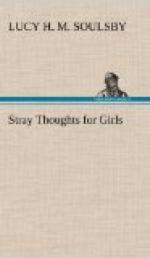I have heard a girl rebel against her life, on the ground that she had a right to a good time; youth was the time for pleasure, she would never again have such a power of enjoyment, and it was absolutely criminal on her parents’ part not to provide her with more. I thought she already had more than most; but in any case, I did not agree with her in saying that she must enjoy now, or not at all. In case it should be any comfort to those of you who may have a dull life, I can tell you that it is not so. I am convinced we all have a certain power of enjoyment, and if you can get your fill of pleasure in youth, you do not find as much keen enjoyment in middle life as if you had been kept on a shorter allowance. It is true you do not enjoy quite the same things—there are youthful amusements which you can only enjoy at a certain stage; but take comfort, if you do not get as much as you would like now, it will only mean keener enjoyment of the pleasures of the next stage of life.
But what struck me most was her fundamental assumption that Pleasure was a valid object in life, and that she was sent into the world to get as much as she could.
If so, I think the world is a great Failure. I often hear people saying, “I cannot believe in God, because of the Pain in the world;” and if this world was the end of things, that would be reasonable; if Pleasure is the object of Life, it would be better never to be born! But if we are sent here to grow, then I cannot understand Pain being a reason for doubting God’s love. Looking back on life, I am sure each will feel, “I could not afford to miss one of its shadows, no matter how black they were at the time.” And the fact that you and I each feel that the key of God’s love fits the lock of our individual life, should be one valid reason for believing that all Life is ordered for a right and noble purpose; our happy lives are as real a bit of Life, and as good a specimen of God’s government, as sad ones.
People say to me, “Yes, I feel as you do about myself, but others have such terrible shadows that I cannot feel God is good!” Well, some sufferers tell me they would not change their life, for they feel God’s love in it: surely they have a right to speak. We learn from them that Pain works rightly into life.
What makes a woman’s life worth living? That she has had this or that pleasure—that she has riches or poverty—that she is married or lonely, that she married the right man or the wrong?
No! What matters is, whether she is growing more and more into tune with the Infinite? Is she learning God’s lesson, and fitting herself for the still nobler life He wants to give her?
You and I came into the world to do our part in a noble battle—
“’Twere worth
a thousand years of strife,
’Twere worth a wise
man’s best of life.
If he could lessen but by
one
The countless ills beneath
the sun.”




